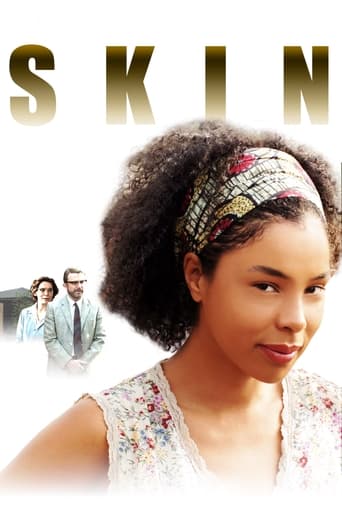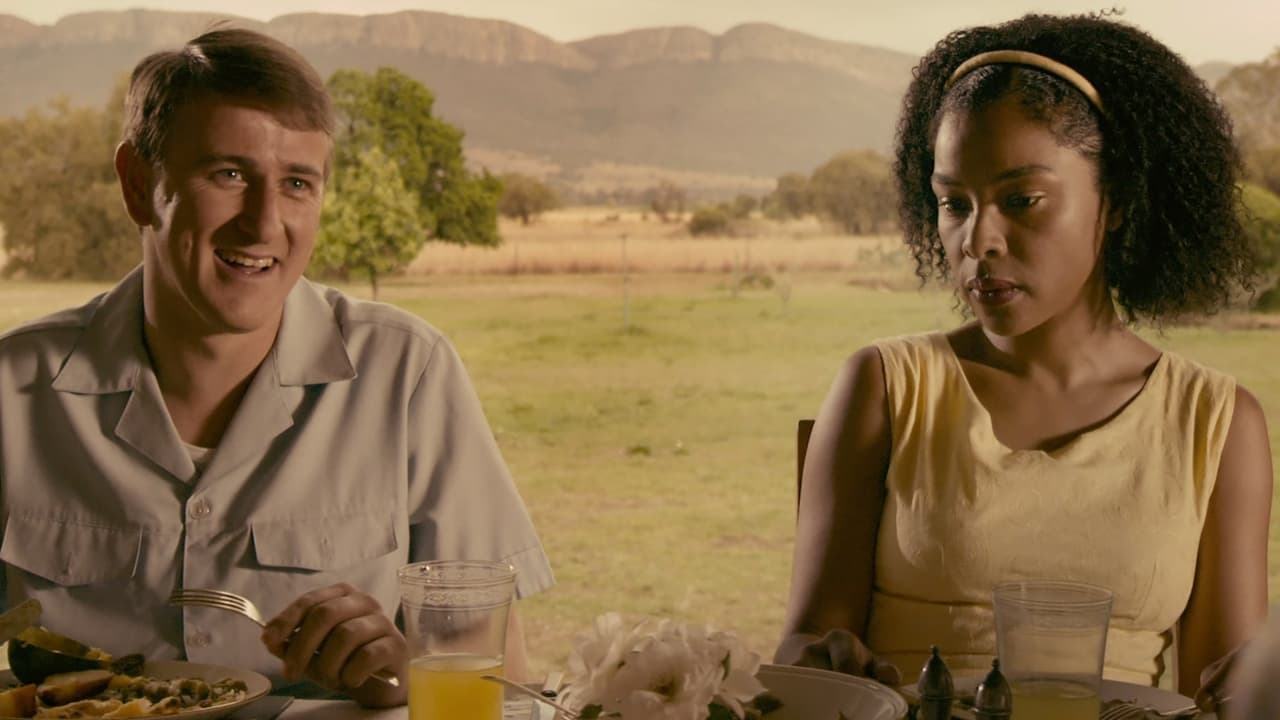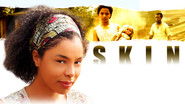ray-cann
Can two white-looking people produce a darker-skinned baby?Anthony Fabian's "Skin" tells the fascinating story of Sandra Laing, a black South African woman who was born to white Afrikaner parents during apartheid in South Africa.Growing up, Sandra appears to have had a happy childhood. She does not appear to think she is different from her parents or older brother, who is also white; she resembles her family a great deal except for her skin color. When she is older, her parents send her and her brother to an exclusive school, for whites only of course. There, Sandra is finally aware that she is different. There are stares, mockery, whispers, and the assumption she does not now where Swaziland is (you'll understand this after you see the film).Her battles have just begun. She is constantly classified, unclassified, reclassified as white and colored, but Sandra has always felt white. Is she white? To someone in 2013, she would appear multiracial or even racially ambiguous, but, remember folks, this is South Africa in the 1950s.Fabian casts the brilliant British actress Sophie Okenedo in the role of Sandra. She is superior in this role, not just because of her raw talent, but her mixed Jewish, Scottish, and Nigerian heritage probably allowed her to form a closer bond with Laing and project her struggles. Okenedo is joined by former "Hotel Rwanda" costar Tony Kgoroge, Sam Neill and South African actress Alice Krige, who play her parents respectively.The Laings and society must deal with the reality of Sandra's skin color because it will not go away no matter what the "papers" say. She does find some happiness with the Black South African community, but it comes at a large price. What is Sandra? Who is Sandra? It's time to ask the inevitable questions. Did Sandra's mom have an affair with a nonwhite man? Is there a such thing as the throwback gene? Were there members of her family's who were or are even passing for white? I won't spoil it for you.Whatever your thoughts are, this is a movie worth seeing. A superior cast that demonstrates what all parties had to do for...survival.
cs629
This is a movie that tugs at your heart strings and brings the ugly truth of prejudice to light. Sandra is a strong women who fights through many battles and achieves more than can be expected. She is courageous despite the many obstacles that lie in her way. We all experience identity struggles as we grow up but Sandra's was above the norm and she faced it head on with dignity.Prejudice is the focus of the movie and how we as a people allow this to determine how and what we feel about one another. Just as in the movie Roots we see the struggle of the African American people, in the movie skin we are brought in on a more personal level as we see the internal struggle of one girl as she grows into a women looking for acceptance and love. The question is where will she find it.Sophie Okonedo portrays the character of Sandra with touching and emotional quality. Her facial expressions bring you into her heart without a word being said. The soft lighting and grainy texture of the film bring the conflict and emotion out of the screen and into your living room. This is a must see movie.
gradyharp
Too few of us realize the atrocities of Apartheid, a social and political policy of racial segregation and discrimination enforced by white minority governments in South Africa from 1948 to 1994. 'The term apartheid (from the Afrikaans word for "apartness") was coined in the 1930s and used as a political slogan of the National Party in the early 1940s, but the policy itself extends back to the beginning of white settlement in South Africa in 1652. After the primarily Afrikaner Nationalists came to power in 1948, the social custom of apartheid was systematized under law. The implementation of the policy, later referred to as "separate development," was made possible by the Population Registration Act of 1950, which put all South Africans into three racial categories: Bantu (black African), white, or Coloured (of mixed race).' Yes, everyone knows the story of Nelson Mandela and the end of Apartheid, but too few of us recognize the appalling effects of that system on the peoples of South Africa. This true story should alter that and perhaps bring a higher degree of respect for those who survived that ugly system. Based on the book 'When She Was White' by Judith Stone, Anthony Fabian wrote the story (with Helen Crawley, Jessie Keyt and Helena Kriel) and directs this terrifying but ultimately triumphant film - a story we shall not soon forget. Abraham and Lannie Laing (Sam Neill and Alice Krige) are Afrikaans who live and work their general store in the countryside with their two children Sandra (Ella Ramangwane as the young Sandra and Sphie Okenedo as the mature Sandra) and Henry. The Laings have sequestered themselves because their daughter appears black. Abraham constantly defends the 'whiteness' of his daughter at every level of the government and finally the Laings obtain admission to private white school for Sandra and Henry. The school quickly dismisses Sandra because she 'is black', is beaten by teachers, and the school calls in doctors and other government support to back their opinion. But through the tireless efforts of Abraham he finally gets a certification of Sandra's 'whiteness'. Sandra faces intolerance from the community but finds solace in the attention of a 'kaffir', Petrus Zwane (Tony Kgoroge) and in time the frustrated Sandra accepts the warmth of Petrus and they fall in love. Abraham is furious and casts Sandra out of his home: Sandra and Petrus move into a black village and have babies until the whites demand the land on which the blacks are living and destroy Sandra and Petrus's home. Petrus turns to drink and blames his loss of all his goods on marrying a 'white girl': Sandra and her now three children move to Johannesburg to find safety and employment, having been rejected by Sandra's parents. When the Apartheid is banished Sandra becomes a spokesperson for her people and her country because she 'never gave up'. In this history of the Apartheid the impact is made so very much stronger by the fact that the film shows both sides of the struggle - from the white viewpoint and the black viewpoint. Sandra's father may have fought against the prejudice but when his daughter accepts being black, he is as raw and prejudiced as the rest of the whites. Sandra's mother (played with compassion by Alice Krige) maintains her love and support of her beloved daughter but by societal demands she must bow to her husband's wishes. As Sandra Sophie Okenedo shines in a performance that is brilliantly three dimensional - she is an enormously gifted actress. The entire large cast is excellent, recreating a period in history we can only hope will never happen again. This is a wholly satisfying film. Grady Harp
johno-21
I saw this last month at the 2009 Palm springs International Film Festival. This is based on the true story set in South Africa during the Apartheid system of a Sandra Laing (Sophie Okonedo), who was born of dark skin to two Afrikaaners of white Eropean descent Abraham (Sam Neill) and Sannie (Alice Krige) Laing. Sandra is a genetic throwback because unknown to her parents, and like many Afrikaaners, there was mixed blood in their heritage between the Euopeans who settled in South Africa and the indigenous Africans. The story begins with Sophie getting expelled from an all-white school because of her differences in appearance. She is reclassified as dark. Her father (who is himself a bigot) fights to have her reclassified as white. She eventually is but against her family wishes she causes an unbreakable divide when she decides to marry a black man and have herself reclassified yet again as black. This is the feature film directorial debut of writer/director Anthony Fabian who was also present at my screening for an audience Q&A. The screenplay is from Helen Crawley but there was a book written recently by author Judith Stone called When She Was White that goes more into the complete story of Sophie's life. This film covers Sophie from around age 10 through her first marriage. Both Fabian's film and Stone's book had the cooperation of Sophie herself in their making. An excellent cast with three veterans in the principal roles with Neill, Krige, and the young but very busy Okonedo who was an Oscar nominee for Hotel Rwanda. This is a good film but it plays more like a made for TV movie and HBO, BET, Hallmark, A&E, AMC or Lifetime should all consider showing this. I would give this an 7.5 out of 10 and recommend it.


 AD
AD







